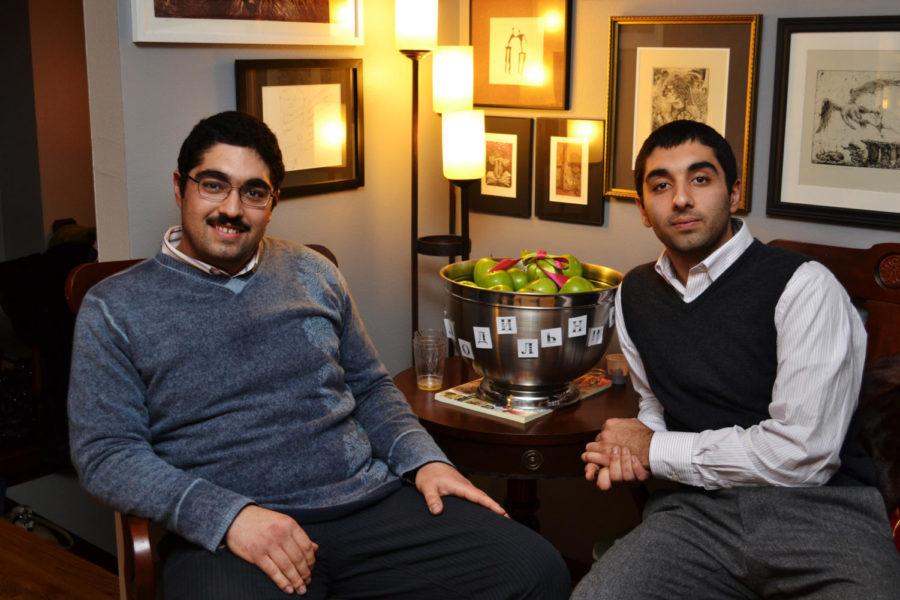Students attacked by neo-Nazis assess reasons for hate
Photo:David Babayev/Iowa State Daily
Ivan and Ruben Martirosov, both seniors in business economics, describe a troubling story of aggression and hate by neo-Nazis near their home in Russia. Even though the movement is getting smaller, it is still extremely prevalent.
December 12, 2011
The Russian-Armenian brothers Ivan and Ruben Martirosov have learned many lessons in their time as ISU undergraduates, but none can match the brutality of one they learned well before college.
In 2005, while on a visit to Moscow, the two were walking to their parents’ apartment in the company of two friends. As the group neared the apartment, six young men spotted and attacked them.
Ivan recalls the attackers shouting “Russia’s for Russians” and “Get out of our country” as they beat them. Neither he nor anyone he was with had said a word to provoke them.
Both the men’s words and their style of dress made the brothers think they hadn’t been attacked at random.
“One of them had a swastika on his jacket,” Ivan said.
The Martirosovs, both seniors in business economics, have the dark eyes, skin and complexions of their Armenian ancestors. They share these features with most natives of Europe’s South Caucasus region, thousands of whom — in search of jobs — have immigrated to Russia since the 1990s.
The brothers’ brief clash with neo-Nazis confirmed a painful fact: in modern Russia, their looks alone make them targets.
Neo-Nazi violence has been a feature of Russian life since 1991, when the Soviet Union collapsed. As the new Russian state was forged, thousands of immigrants streamed across its borders. Faced with an influx of new immigrants, a dearth of jobs and a declining ratio of Slavs to non-Slavs in the population, some Russians have turned to Nazism.
Current TV documentarian Christof Putzel explored their motives in the 2008 documentary “From Russia with Hate.” In the film, he reported that Russia was home to about half of the world’s neo-Nazis, saying there were between 50,000 and 70,000 in the country. Some have taken to posting their attacks on YouTube.
The Russian civil-rights group SOVA estimated that 71 people died and more than 330 were wounded in 2010 as a result of racially motivated attacks. Citing these figures, Claire Bigg, a reporter for the news service Radio Free Europe, wrote that the number “while high, is a sharp decline from previous years.”
The irony of Russians embracing Nazism isn’t lost on the Martirosovs, who note that these modern neo-Nazis are descended from people who repelled a Nazi invasion in World War II.
“The whole idea is a farce,” Ruben said.
Slavic Nazis, such as those in Russia’s National Socialist Party, also overlook German Nazis historic view of Slavs as a subhuman race — one only worthy of enslavement, exploitation or murder.
Speaking of these contradictions, Ruben credited youth and ignorance with fueling attraction to Nazi movements.
“Kids from 14 to 18, they don’t have their own opinions,” he said. “You have a couple of beers in them, and tell them what to think. They’ll think that.”
He also blamed Russia’s economic troubles for spurring interest in extremist groups.
“I think it goes back to income inequality. You have a certain amount of opportunities created in Russia, which are a lot better than opportunities created in, say, Tajikistan,” Ruben said. “When you have immigrants going into Russia, and Russia’s economy itself is not doing so good, of course the logical choice with leaders is to find a scapegoat.”
Though media accounts can make Russian neo-Nazism seem a dire menace, some are skeptical of the movement’s size and influence. Youngwon Kim, lecturer in political science, counts himself among these skeptics.
“We need to see the numbers,” Kim said. “There is no Nazism functioning as a major political movement.”
Kim reviewed the results of Russia’s recent parliamentary elections, saying that he wasn’t aware of Nazism-espousing leaders gaining elected office in the country. As long as this is the case, he said, neo-Nazis won’t pose a major threat to Russia’s social stability.
Like Kim, Ivan Martirosov rates the true extent of neo-Nazi influence in Russia as minimal.
“I think with years and years, it’s actually getting more dissipated,” Ivan said.
But the movement’s relative lack of power doesn’t make him hate it any less.
“I hope it’s destroyed,” he said.







